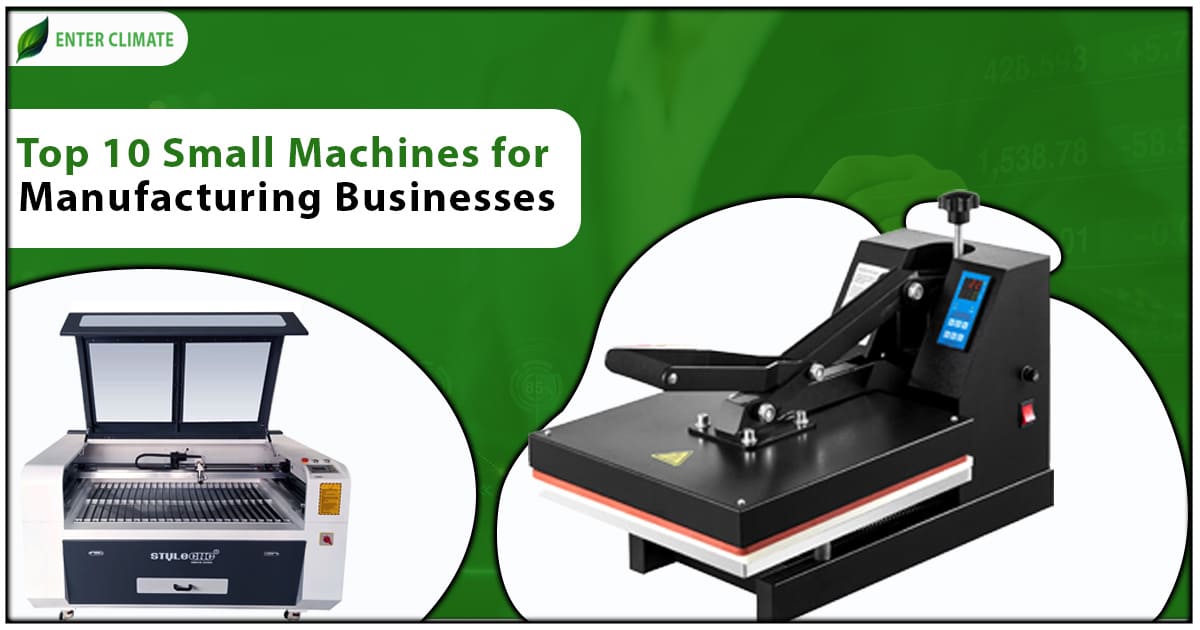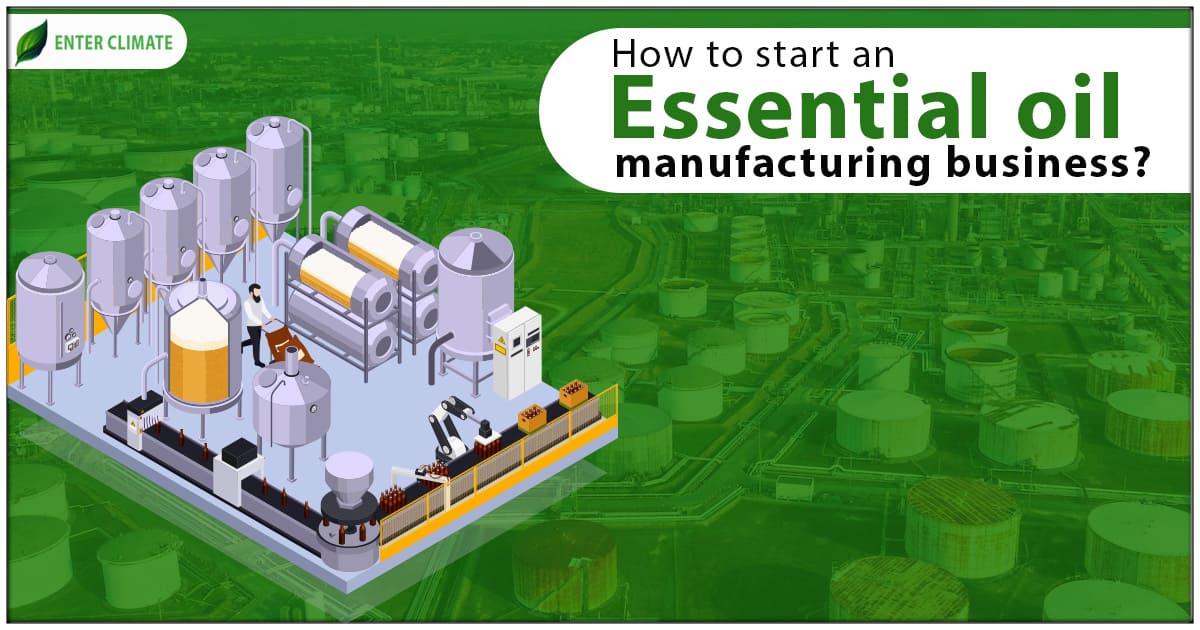Top 10 Small Machines for Manufacturing Businesses
 05 Jun, 2023
05 Jun, 2023 
Starting with manufacturing businesses can feel overwhelming, but as the owner, investing in small machinery can significantly simplify your operations and make them more efficient. This, in turn, helps you stay on track and reach your goals consistently. However, small businesses often need more funds to buy large machines that require a lot of space. Luckily, numerous small machines are available that are ideal for small manufacturing industries. These machines can play a crucial role in creating a more competitive product. we discuss the Top 10 Small Machines for Manufacturing Businesses.
List of Popular Machines Used in Manufacturing Businesses
There are plenty of Small Machines for Manufacturing Businesses, but here listed are the top 10 machines:
1. CNC Machine
CNC is an abbreviation for “computer numerical control,” which means the device operates through programmable automation, much like 3D printing. It is the most important type of Machines for Manufacturing Businesses, which enables builders to create intricate parts that can be precisely cut quickly and efficiently, even on a large scale. Small-scale CNC machines are affordable and do not require much space. There are abundant online resources for individuals interested in learning how to operate them. These machines empower startup entrepreneurs to produce custom products in their garage or basement, enabling mass production with limited resources.
2. Heat Press Machine
A heat press is a machine that uses heat to apply designs onto different materials. It applies pressure from a heated upper platen onto a lower platen to achieve the desired results. These machines are commonly used to transfer designs onto various garments. One significant benefit of using a heat transfer t-shirt printing machine is its cleanliness compared to a screen-printing device. Heat transfer printing is less messy than screen printing, which involves solvents and dyes.
3. Injection Moulding Machine
Injection moulding machines for Manufacturing Businesses enable the production of parts in large quantities. It involves injecting molten materials into a mould. This process is commonly employed for mass production, allowing the creation of thousands of identical items. Injection moulding offers notable advantages in terms of its ability to achieve high repeatability and reliability. A key benefit of plastic injection moulding is its exceptional repeatability. Once a mould is created, it becomes possible to manufacture thousands of parts without frequent tooling maintenance.
4. Laser Cutter
A laser cutting machine is frequently utilised machines for Manufacturing Businesses to achieve precise cuts on machine components. In industrial settings, this machine is commonly employed for cutting structural materials, piping materials, and flat sheet metals. Additionally, by adjusting the CNC settings, the machine can etch or engrave various designs on metal, wood, and plastic. Specialised CAD (computer-aided design) software is employed to program the CNC and guide it in executing the required cutting, engraving, or etching specifications for the laser cutting project. The size and capacity of the laser cutting machine determine its suitability for smaller or larger-scale manufacturing projects.
5. Embroidery Machine
Embroidery machines for Manufacturing Businesses are employed for stitching designs onto various materials rather than manufacturing complete garments. They are commonly utilised to create personalised clothing items, such as branded workwear and sportswear. However, they need help to produce the garments themselves or join materials to form complete pieces. Establishing an embroidery business at home can be highly lucrative. Many individuals who begin with a 15-needle embroidery machine in their home eventually expand to a 4-head machine and attract numerous customers over time. One of the key factors contributing to its profitability is the relatively low cost of embroidery supplies.
6. 3D Printer
3D printing can be advantageous for your business regarding prototyping or low-volume manufacturing. 3D Printer Machines for Manufacturing Businesses that design devices and mechanical parts for industries that need precise dimensions, such as biomedical devices, auto parts etc. However, it is crucial to ensure the integrity of your supply chain and maintain product quality to safeguard against unauthorised 3D printing. Many businesses undergo extensive and potentially costly prototyping phases as they develop, test, and refine their products and components. Prototypes also serve as essential tools in marketing. By leveraging 3D printing, these cycles can be accelerated while keeping costs down.
7. Screen printing machine
Screen printing is a widely utilised technique that involves pressing ink through a mesh screen to produce a printed design. It is extensively employed in various industries worldwide to create customised clothing, canvases, artwork, posters, and other items. Screen printing shops can be lucrative as they provide a sought-after service that is in high demand. Moreover, these businesses can maintain low costs since the equipment required to initiate a screen-printing venture is relatively affordable.
8. Packaging Machine
Packaging machines for manufacturing businesses are utilised for packaging various products or components. This equipment category encompasses machinery that performs tasks such as forming, filling, sealing, wrapping, cleaning, and packaging, operating at different levels of automation. Additionally, packaging machines include related machinery for sorting, counting, and accumulating items. By employing packaging machines, materials can be efficiently packaged at higher speeds, eliminating the fatigue associated with manual processes. Automated systems also enhance consistency, improving cycle times and overall operational efficiency.
9. Paper Cup-Making Machine
The paper industry presents significant opportunities for both large corporations and small to medium-sized enterprises. Paper is a highly versatile material that finds extensive use in various aspects of our daily lives, with a wide range of applications across different industries. For instance, it is utilised in packaging, publishing, and more. In the food service sector, paperboard is transformed into reels, which are subsequently printed and precisely cut into cup sidewall blanks. These blanks are then fed into cup-forming machines, wrapped into cup shapes and fitted with bottoms. To ensure the cups are resistant to liquids, the seams are heated, creating a liquid-proof seal.
10. Shredder
Shredder is another important Machine utilised to break down large materials for volume reduction, recycling, and product destruction. Industrial shredders come in different sizes and designs based on the particle size that will be needed for the final shredded product.
Advantages of getting a factory license for Manufacturing Businesses
The primary objective of obtaining a factory license is to ensure the implementation of essential safety measures that promote workers’ well-being, health, and safety. Here are a few benefits associated with acquiring a factory license.
- Ensures Employee Protections: The Act provides specific provisions for young workers, female employees, work hours, employee pay, and other workplace-related regulations.
- Access to Legal Benefits: Factory owners become eligible for legal benefits offered by the government through various programs.
- Enhanced Workforce Productivity: Properly implementing the requirements and principles outlined in the Factories Act 1948[1] leads to increased productivity among the workforce.
- Regulation of Various Aspects:
- The Act helps regulate multiple factors, including:
- Working hours
- Wages and payments
- Leaves and holidays
- Recruitment of young workers and women
- Employee hiring and termination procedures
- Terms of service and other rules applicable to individuals working in stores, businesses, public entertainment venues, etc.
- Equality in Benefits: All employees enjoy equal advantages when the Factories Act is adhered to effectively.
Documents needed to apply for a Factory License
The documents required for obtaining a factory license include the following:
- Form-1 (Particulars of the Factory)
- Copy of the factory building plan, along with proof of the applicant’s identity and address
- A comprehensive list of each director involved
- Resolutions from the Board, Memorandum of Association (MOA), and Articles of Association (AOA)
- Any partnership agreements, if applicable
- Account information
- Proposed start date of operations
- Payment receipts
- Land titles
- Consent from relevant authorities
- Machinery specifications
- Specifications for hazardous and non-hazardous waste
- Details about raw materials, products, and finished goods, including a process flowchart
- Tax invoice
Procedure to apply for a factory license
The process of registering a license in India can be completed by following the following steps:
Step 1: Plan Submission:
- Prepare and submit the plan according to the regulations specified by the state government.
- Obtain approval from the State Government or Chief Reviewer before initiating any construction or expansion of the industrial facility.
Step 2: Owner Details:
- Provide the following information as the owner:
- Type of manufacturing process
- Number of employees
- Factory name and ownership details
- Factory address
- Name of the manager
- Information about the machines for Manufacturing Businesses
Step 3: Application Filing:
- Apply for approval in Form-1, along with all the necessary supporting documents duly signed.
Step 4: Fee Payments:
- Once the application receives approval, pay the required licensing fees.
Step 5: License Issuance:
- The Department issues the license after paying fees and completing the inspection.
- The Department ensures that all documents and the application form comply with regulations and norms.
Permits and approvals for starting any Manufacturing Business
Entrepreneurs can seize lucrative business opportunities with the help of machines for manufacturing business when establishing a manufacturing plant in India. However, it is crucial to comprehend the legal requisites and licenses necessary for operating such a plant in India. The following licenses are typically required for setting up a manufacturing plant:
- Industrial License: Issued by the Ministry of Commerce and Industry.
- Pollution Control License: Issued by the State Pollution Control Board.
- Fire License: Issued by the Fire Department of the relevant state.
- Company Registration.
- GST Registration.
- Import-Export Code.
- Trademark Registration.
- HWM Authorisation.
- Electrical Inspectorate License/ CEIG Approval.
- State-specific licenses or permits, such as Shops and Establishment License, Liquor License, Health License, etc.
- Environmental Clearance (if applicable): Obtained from the Ministry of Environment, Forest, and Climate Change.
- Consent to Establish and Operate (CTE): Obtained from the State Pollution Control Board.
- Factory License: Issued by the Chief Inspector of Factories.
Conclusion
Businesses can utilise these small machines for Manufacturing Businesses, which include CNC machines for precise cutting and automation, heat press machines for clean and efficient design applications, injection moulding machines for large-volume production, laser cutting machines for precision cutting and engraving, embroidery machines for personalised items, 3D printers for prototyping and low-volume manufacturing, screen printing machines for custom printing, packaging machines for efficient and automated packaging, sewing machines for stitching fabric, and paper machines for versatile paper-based applications. As mentioned above, these manufacturing businesses require certain clearances and approvals at the central and state levels. It is highly recommended to take expert advice to obtain clearances and other regulatory compliance mechanisms for a hassle-free experience.
Read our Article:New Business Opportunities Under The National Green Hydrogen Mission Of India













